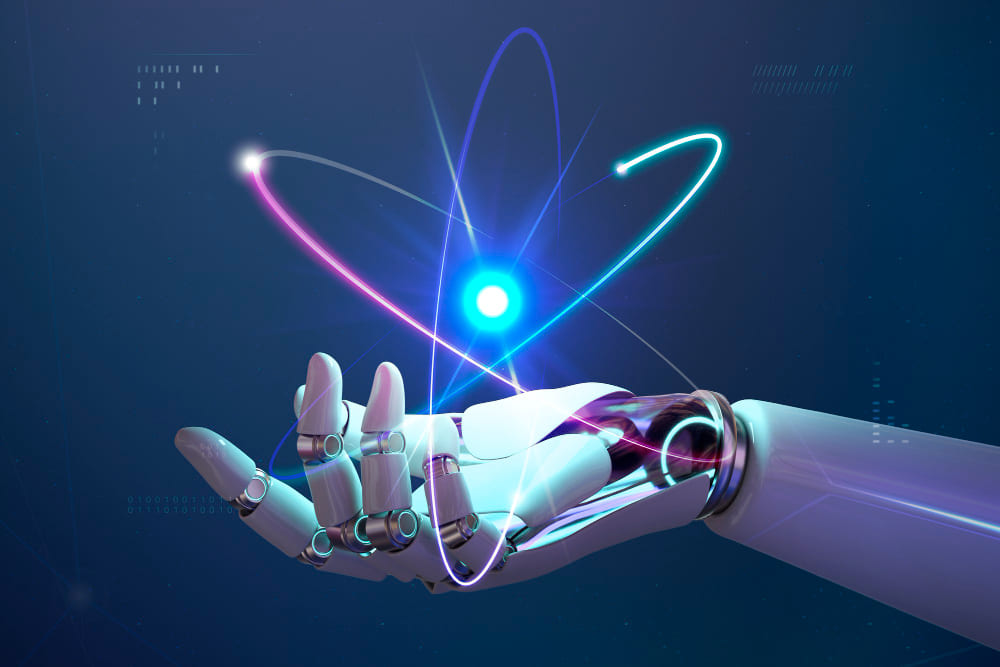What Is Artificial Intelligence or AI and Why Is It Important?
Our world is constantly evolving, driven by technological advancements in every aspect of our lives. Among these advancements, one stands out for its potential to reshape society: What Is Artificial Intelligence?
This comprehensive article will delve into the concept of AI, its significance, and its transformative role in our rapidly changing world.
What Is Artificial Intelligence?
Artificial intelligence involves using complex algorithms incorporated into computer and machine systems to make them behave like humans. It aims to give computer systems the ability to act like people.
Artificial intelligence covers various technologies, such as automatic language understanding, visual perception, and automated machinery. Artificial intelligence systems acquire knowledge from information, adjust to fresh inputs, and generate independent judgments, allowing them to imitate human mental procedures.
What Is The Origin Of Artificial Intelligence?
Artificial Intelligence is rooted in ancient times when philosophers contemplated the mysteries of life and death. In those distant eras, inventors crafted mechanical devices known as “automatons,” which could move independently without human aid.
The term “automaton” originates from ancient Greek, denoting the capacity to act autonomously. A historical account from 400 BCE mentions a mechanical pigeon designed by a companion of the philosopher Plato as one of the earliest recorded automatons.
Also Read: Digital Marketing for Small Businesses and Startups in India
Centuries later, the renowned artist and inventor Leonardo da Vinci created one of the most well-known automatons around 1495.
Although the notion of self-functioning machines traces back to antiquity, this article will primarily concentrate on the advancements made in the 20th century by engineers and scientists, leading us closer to modern-day AI.
Also Read: What Is ChatGPT, And How Can You Use It?
Why Is AI Important Today?
Artificial intelligence (AI) holds immense significance in the present-day world for various rationales. They include:
Automation and Streamlined Efficiency
One notable aspect is its ability to automate diverse tasks and processes, amplifying efficiency and productivity across multiple industries. AI-driven systems possess the potential to manage repetitive and monotonous tasks, liberating human workers to concentrate on more intricate and imaginative undertakings. It can result in considerable time and cost savings for enterprises.
Data Examination and Insights
With the exponential expansion of data, AI assumes a pivotal role in examining and extracting valuable insights from extensive datasets. AI algorithms can effectively process vast information, identify patterns, and generate predictions, empowering organizations to make data-informed decisions and attain a competitive advantage.
Customization and Enhanced Customer Experience
AI technologies enable personalized encounters for consumers. AI-driven recommendation systems can scrutinize user preferences and behaviour, offering tailored product suggestions, content recommendations, and customized advertisements. It enhances the overall customer experience and aids businesses in providing more relevant and targeted offerings.
Healthcare and Medicine Advancements
AI possesses the potential to revolutionize the domains of healthcare and medicine. Machine learning algorithms can assist in disease diagnosis, analyze medical images, and forecast patient outcomes. AI-powered tools can also streamline administrative tasks, enhance patient monitoring, and boost the efficiency of healthcare systems.
Autonomous System
AI drives progress in autonomous systems, such as self-driving vehicles, unmanned aerial vehicles, and robots. These technologies can potentially transform industries like transportation, logistics, and manufacturing. Autonomous systems powered by AI can enhance safety, optimize efficiency, and enable the development of new capabilities and services.
Empowered Decision-Making
AI provides invaluable insights and support for decision-making processes. By analyzing intricate data, recognizing trends, and simulating scenarios, AI systems can aid humans in making informed decisions across various domains, including finance, business strategy, and policy formulation.
Addressing Complex Challenges
AI finds application in addressing some of society’s most pressing difficulties, such as climate change, resource management, and disease prevention. By leveraging AI’s capabilities in data analysis, modelling, and optimization, researchers and organizations can devise innovative solutions to intricate problems.
Use Cases of Artificial Intelligence
Artificial Intelligence (AI) possesses extensive applications across various fields, facilitating efficiency improvement, enhanced decision-making, process automation, and the introduction of new capabilities. Presented below are several typical scenarios where AI is employed:
Virtual Assistants:
Utilizing natural language processing (NLP) and machine learning algorithms, AI-powered virtual assistants like Siri, Google Assistant, and Alexa can comprehend and respond to user inquiries, perform tasks, and offer personalized recommendations.
Recognition of Images and Speech:
By employing AI algorithms, it becomes possible to analyze and interpret images, videos, and audio data. This technology finds utility in facial recognition, object detection, voice assistants, and automated speech transcription.
Autonomous Vehicles:
AI plays a pivotal role in self-driving and autonomous vehicles, allowing them to perceive their surroundings, make real-time decisions, and navigate safely. AI algorithms process data from cameras, lidar, radar, and other sources to control the vehicle’s movements.
Predictive Analytics:
AI models can scrutinize vast amounts of historical data, uncovering patterns, trends, and correlations. This capability enables organizations to make informed decisions and accurate predictions in finance, marketing, supply chain management, and healthcare.
Detection of Fraud:
AI aids in detecting fraudulent activities by scrutinizing extensive datasets for patterns and anomalies. In financial institutions, AI has wide use in identifying fraudulent transactions and credit card fraud.
Recommendation Systems:
AI-powered recommendation systems, commonly found in e-commerce platforms, streaming services, and social media, leverage collaborative filtering and content-based algorithms to provide personalized suggestions based on user preferences and behavior.
Natural Language Processing (NLP):
AI algorithms can understand and generate human language. NLP applications include sentiment analysis, chatbots, language translation, and text summarization.
Healthcare Diagnosis: AI assists healthcare professionals in diagnosing diseases by analyzing medical images, patient records, and symptoms. It aids in pattern recognition and predicting potential health risks.
Robotics:
AI empowers robots to perform intricate tasks, interact with their surroundings, and adapt to changes—industries such as manufacturing, logistics, and healthcare benefit from this technology.
Cybersecurity: AI algorithms can detect and prevent cybersecurity threats by analyzing network traffic, identifying suspicious patterns, and responding to real-time attacks.
FAQs
Who is the father of Artificial Intelligence?
Together with Alan Turing, Marvin Minsky, Allen Newell, and Herbert A. Simon, John McCarthy stands as a distinguished figure among the “pioneers” of artificial intelligence. McCarthy played a pivotal role in shaping the field, earning his place as one of its “founding fathers.”
AI research was founded in which country?
During the summer of 1956, a workshop took place at Dartmouth College, USA, where the foundation of AI research started.
AI uses which programming language?
Python, widely utilized in AI, offers various packages for different applications, including general AI, natural language processing, artificial neural networks, and machine learning.
Final Words
Artificial Intelligence (AI) is a groundbreaking technology with the potential to revolutionize numerous aspects of our lives. AI offers immense value across industries, from automation and streamlined efficiency to data analysis and insights.



